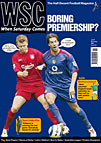 In two years Wales have gone from the brink of qualification glory to an effective play-off for last spot with Azerbaijan. Huw Richards looks for optimistic signs
In two years Wales have gone from the brink of qualification glory to an effective play-off for last spot with Azerbaijan. Huw Richards looks for optimistic signs
Laughter may have echoed from Anglesey to Usk when David Healy angled his shot across Paul Robinson at Windsor Park, but Northern Ireland’s victory over England was not without its downside for Wales. As well as putting plaudits for a spirited display against the English at the Millennium Stadium into more sobering perspective, the result ended any chance of matching an initial fourth-place seeding. Victory over Azerbaijan in the final home match would at least avert a last-place finish, but come what may at Windsor Park on October 12, Wales cannot finish higher than fifth.
Scrambling to finish higher than Azerbaijan less than two years after qualification for Euro 2004 looked seriously possible, with a draw in Russia secured and a home leg in front of a packed and raving Millennium to come, looks like headlong decline. At times – the miserably listless performance against England at Old Trafford, the home defeat by Austria – it has felt like it. As ever a little perspective helps.
We’ve been here before. Wales rarely qualify for tournaments. From 15 World Cup qualifying campaigns and 11 for the European Championship, we’ve had one success. Even the fondly remembered 1958 World Cup quarter-finalists, our most gifted postwar assemblage with Ivor Allchurch, Cliff Jones, Jack Kelsey and the Charles brothers all near their peak, only made it as a lucky loser drawn from the European runners-up for the (then) simple task of eliminating Israel. Strange, then, that the one straight-up qualification, that of the Euro 76 team who beat Hungary, Austria and Luxembourg to reach the quarter-finals – then lost a two-legged tie to Yugoslavia – is largely forgotten.
Since then there have been near-misses and hard-luck stories – Jordan’s penalty, Bodin’s penalty, Titov’s drug positive. Perhaps we’re still paying for that second chance in 1958. And that’s how the good campaigns finish. The bad ones finish like this.
This particular decline started well before the Russia game. That 1-0 home defeat, though bitterly disappointing, followed a run of taking only a single point from the last four Euro 2004 qualifiers. Six of the nine goals conceded came in the last 20 minutes of games, a classic symptom of a team that is not quite good enough. The World Cup campaign was dead almost as soon as it started, with draws away to Azerbaijan and at home to nine-man Northern Ireland even before Old Trafford.
After years of fearing that Mark Hughes would be snatched away by a Premiership club, most were relieved when it actually happened. Nobody wanted him sacked – he had achieved too much for Wales to deserve that – but any sense of progress had long gone. Given that the Football Association of Wales’s financial limitations restrict choice to the inexperienced, the jobless and the superannuated, the list of potential successors could have been much worse. Brian Flynn’s proven ability with moderate players commended him, but on overall achievement it was hard to argue against John Toshack.
So far, so bad. P4 L4 F0 A5. But there’s an awareness in Wales of the poverty of Toshack’s inheritance – few Premiership players, and those that there are include Craig Bellamy and Robbie Savage. Nor do too many seem concerned about his axing of Savage, breaking the unhappy tradition that Wales must field a midfield provocateur of mediocre passing ability – he had succeeded the still more talentless and charmless Vinnie Jones – perhaps because his self-dramatising whingeing over this and his earlier suspension from the Old Trafford game revealed an off-field persona no more palatable than the on-field one that does so much for Blackburn’s popularity.
There was evidence of both organisation and spirit in the defeats by England and Poland last month. Wales will continue to lose matches because opponents have better players, but at least under Toshack we’ll know that that – rather than the other team having a more tactically sophisticated manager – is the reason.
While Ryan Giggs’s “I am what I am” Reebok adverts stick in the throat of those who remember him as mostly injured whenever Wales had a friendly, he appears committed as captain – after all, under Fergie’s current arrangements at Old Trafford, internationals are his best chance of getting a decent game. John Hartson continues to battle to the limits of diminishing mobility, Bellamy’s talent earns him leeway not extended to Savage and there’s a nucleus of international competence in the shape of Simon Davies, Jason Koumas, Mark Delaney, Robbie Earnshaw and Danny Gabbidon. Those who are counting will note that that makes eight, two the wrong side of 30 and a shortage of defenders. How far that group gets to play in a competitive Wales team who can at least hope to qualify for something, rather than the other type, will depend on their own continued form and fitness plus whether the young defenders promoted by Toshack – Sam Ricketts, Richard Duffy, James Collins and David Partridge among them – develop into competent international players. Finding a goalkeeper would help.
The Euro 2008 draw, given the probability of a still lower seeding, is likely to be tough. But being a Wales fan makes you grateful for small mercies and avoiding yet another trip to Azerbaijan will be enough for many.
From WSC 225 November 2005. What was happening this month
There ought to be a name for players who were quite recently regulars for prominetnt clubs but you'd forgotten they existed. Anyway, if there was then Mark Delaney is one.
I remember thinking at the time that, judging by his last paragraph, Richards had never actually been to Azerbaijan